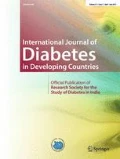Abstract
Background
Glycemic control has remained an enigma despite a large number of anti-diabetic drugs being available. Clinical practice and guidelines have focussed largely on optimal and rational use of anti-diabetes drugs to achieve care goals. This study aims to delineate factors impacting glycemic control from real-world data.
Methods
Retrospective, cross-sectional data comprising 15,689 prescriptions from 4647 people living with diabetes and attending an endocrine clinic over a 5-year period was extracted from EMR (electronic medical records) of the clinic. Data pertaining to drugs prescribed, glycemic control attained and patient behavioral factors like diet, drug and exercise adherence was analysed to delineate the contribution of patient or care team-dependent factors towards glycemic control.
Results
Factors related to patient behavior affected glycemic control linearly with statistically lower HbA1c in people with better adherence to diet, medications and exercise. People who did any self-monitoring of blood glucose at home had significantly better glycemic control. On the other hand, a number of medications were negatively associated with glycemic control. Hypoglycemia had no impact on glycemic control. A number of visits to treating physician were positively associated with glycemic control but impact plateaued after 6 visits.
Conclusion
Patient behavior and activation-related factors are predominant drivers of glycemic control.
Data availability (data transparency)
Available with authors on request.
References
Kastor A, Mohanty SK. Disease-specific out-of-pocket and catastrophic health expenditure on hospitalization in India: do Indian households face distress health financing? PLoS One. 2018;13:e0196106.
Singla R, Bindra J, Singla A, Gupta Y, Kalra S. Drug prescription patterns and cost analysis of diabetes therapy in India: audit of an endocrine practice. Indian J Endocrinol Metab. 2019;23:40–5.
Centers for Disease Control and Prevention. National Diabetes Statistics Report, 2020. Atlanta, GA: Centers for Disease Control and Prevention, U.S. Dept of Health and Human Services. 28 Sep 2020 [cited 3 Jun 2021]. Available: https://www.cdc.gov/diabetes/data/statistics-report/index.html
Unnikrishnan R, Anjana RM, Deepa M, Pradeepa R, Joshi SR, Bhansali A, et al. Glycemic control among individuals with self-reported diabetes in India–the ICMR-INDIAB Study. Diabetes Technol Ther. 2014;16:596–603.
Mohan V, Shah S, Saboo B. Current glycemic status and diabetes related complications among type 2 diabetes patients in India: data from the A1chieve study. J Assoc Physicians India. 2013;61:12–5.
Haghighatpanah M, Nejad ASM, Haghighatpanah M, Thunga G, Mallayasamy S. Factors that correlate with poor glycemic control in type 2 diabetes mellitus patients with complications. Osong Publ Health Res Perspect. 2018;9:167.
Agarwal AA, Jadhav PR, Deshmukh YA. Prescribing pattern and efficacy of anti-diabetic drugs in maintaining optimal glycemic levels in diabetic patients. J Basic Clin Pharm. 2014;5:79.
Wangnoo SK, Maji D, Das AK, Rao PV, Moses A, Sethi B, et al. Barriers and solutions to diabetes management: an Indian perspective. Indian J Endocrinol Metab. 2013;17:594–601.
Weerarathna TP, Weerarathna MK, Senadheera V, Meththananda Herath HM, Liyanage G. Association of self-reported dietary and drug compliance with optimal metabolic control in patients with type 2 diabetes: clinic-based single-center study in a developing country. J Nutr Metab. 2018;2018. https://doi.org/10.1155/2018/3421476
Tan SL, Juliana S, Sakinah H. Dietary compliance and its association with glycemic control among poorly controlled type 2 diabetic outpatients in Hospital Universiti Sains Malaysia. Malays J Nutr. 2011;17:287–99.
Gopichandran V, Lyndon S, Angel MK, Manayalil BP, Blessy KR, Alex RG, et al. Diabetes self-care activities: a community-based survey in urban southern India. Natl Med J India. 2012;25:14–7.
Basu S, Garg S, Sharma N, Singh MM, Garg S. Adherence to self-care practices, glycemic status and influencing factors in diabetes patients in a tertiary care hospital in Delhi. World J Diabetes. 2018;9:72–9.
Polonsky WH, Henry RR. Poor medication adherence in type 2 diabetes: recognizing the scope of the problem and its key contributors. Patient Prefer Adherence. 2016;10:1299–307.
Sue Kirkman M, Rowan-Martin MT, Levin R, Fonseca VA, Schmittdiel JA, Herman WH, et al. Determinants of adherence to diabetes medications: findings from a large pharmacy claims database. Diabetes Care. 2015;38:604–9.
Karter AJ, Parker MM, Moffet HH, Ahmed AT, Ferrara A, Liu JY, et al. Missed appointments and poor glycemic control: an opportunity to identify high-risk diabetic patients. Med Care. 2004;42:110–5.
Lee RRS, Samsudin MI, Thirumoorthy T, Low LL, Kwan YH. Factors affecting follow-up non-attendance in patients with type 2 diabetes mellitus and hypertension: a systematic review. Singapore Med J. 2019;60:216–23.
Low SK, Khoo JK, Tavintharan S, Lim SC, Sum CF. Missed appointments at a diabetes centre: not a small problem. Ann Acad Med Singapore. 2016;45. Available: https://pubmed.ncbi.nlm.nih.gov/27118222/.
Author information
Authors and Affiliations
Contributions
Rajiv Singla (R.S.), Geetu Gupta (G.G.) performed the research. R.S. and Yashdeep Gupta (Y.G.) designed the research study. R.S. analyzed the data. R.S., G.G., and Y.G. wrote the paper. All authors critically edited and endorsed the manuscript.
Corresponding author
Ethics declarations
Ethics approval
Retrospective study, ethics approval not needed.
Consent to participate
Retrospective study.
Consent for publication
Retrospective study.
Conflict of interest
The authors declare no competing interests.
Additional information
Publisher’s note
Springer Nature remains neutral with regard to jurisdictional claims in published maps and institutional affiliations.
Rights and permissions
About this article
Cite this article
Singla, R., Gupta, G. & Gupta, Y. What drives glycemic control in a person living with diabetes?. Int J Diabetes Dev Ctries 42, 369–373 (2022). https://doi.org/10.1007/s13410-021-00979-9
Received:
Accepted:
Published:
Issue Date:
DOI: https://doi.org/10.1007/s13410-021-00979-9

